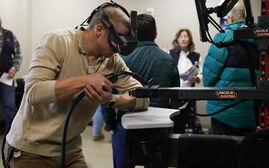A common problem with vexing challenges: Understanding dementia takes patience, self-care, communication
 Stock Illustration / Mary Long
Stock Illustration / Mary Long
Ann Marie Kane had the misfortune of losing her job right around the time she found out her mother no longer had the mental acuity to take care of herself. Kane’s 85-year-old mother, Pauline, was diagnosed with vascular dementia, caused by reduced blood flow to the brain, at the height of the COVID-19 pandemic in 2020.
“All I did for six months was look for a place big enough for us to live together,” Kane says. “To say it was chaotic would be a huge understatement.”
Kane’s mother, who now attends the Southern Maine Agency on Aging’s Sam L. Cohen Center adult day program in Biddeford, is among more than 6 million Americans age 65 and older, including tens of thousands of Mainers, experiencing Alzheimer’s disease or another form of dementia.
Experts say repeating the same story or question, difficulty with everyday tasks, difficulty joining or maintaining a conversation, getting lost, personality changes, confusion about time and place, or troubling behavior such as neglecting grooming or poor judgement in handling money can all be warning signs of the onset of dementia.
It is important to note that the more intelligent a person is, the easier it will be for them to mask symptoms. Changes in personality and behavior are important signals that a loved one is struggling with brain function.
Identifying a memory-related illness is just one step in the journey to provide care and comfort.
Kane says her mom’s symptoms started small, with a tendency to drag her right toe while walking. It took several years for the signs of dementia to become more obvious.
“When you’re with somebody all the time, it can be challenging to notice gradual changes in their behavior,” Kane says.
Talk to others
Unless you have daily contact with an aging family member, it is possible that others are in a better position to look for warning signs. And that’s OK. Do not rule out the possibility that a coworker, friend or neighbor might be more attuned to abnormal changes in behavior and cognitive function.
If you are concerned, seek medical help. As with any disease, early detection is important in developing a treatment plan and finding ways to improve quality of life.
Activity matters
Suffering from dementia can often lead a person to withdraw from activities that have previously been important. Social isolation can lead to depression, which causes additional challenges in care.
Engaging in physical and mental activities, combined with healthy eating, can lower the risks of dementia and can keep your loved one, if suffering from dementia, engaged and stave off isolation and depression.
Communication is key
When caring for someone who has Alzheimer’s disease or another form of dementia, you must pay attention to how you communicate.
Avoid multitasking. Keep distraction to a minimum when communicating with someone who is battling dementia. Put away your phone. Turn off the TV or radio and make sure you are fully dialed into the conversation.
Keep it simple. Processing communication can be difficult for someone coping with dementia-related illness. Speak slowly and understand that repetition, while frustrating to you, can be beneficial to the other person. Ask “yes” or “no” questions.
Don’t argue. What your loved one is saying might be incorrect. It might be hurtful. But that person often does not understand and cannot control what they are saying. Correcting or arguing is not helpful.
Tone matters. Anger and irritation will still register, even if a person doesn’t recognize you and has trouble processing what you are saying. Stay patient.
Seek support
The number of Mainers with Alzheimer’s disease is expected to almost double from about 26,000 in 2010 to nearly 50,000 by 2030, according to University of Maine research. About 12% of Mainers 65 and older have Alzheimer’s, and another 5% have some other form of dementia.
More than 51,000 Maine residents are now caring for a family member with dementia, according to the Alzheimer’s Association. The value of unpaid care they provide is estimated to be $1.8 billion annually. The association says a public health approach is needed to reduce the burden on sufferers and their families.
There isn’t a one-size-fits-all solution for every Maine family dealing with dementia, says Dr. Heidi Wierman, division director of geriatrics and medical director of healthy aging at Maine Medical Center in Portland.
“Every individual experiences dementia differently based on the type and how it impacts the brain,” Wierman says. “It can affect memory, language, personality and motor function, and this is superimposed on our underlying human nature that may have had different strengths to begin with.
“How it impacts an individual will also change over time, and people are more likely to have good and bad days that are more extreme. The Alzheimer’s Association has groups for people with memory loss as well as sessions for caregivers. Groups are for people with all types of dementia, not just those with Alzheimer’s disease.”
Sources: University of Maine; Maine Department of Health and Human Services; Alzheimer’s Association; U.S. Centers for Disease Control and Prevention













0 Comments